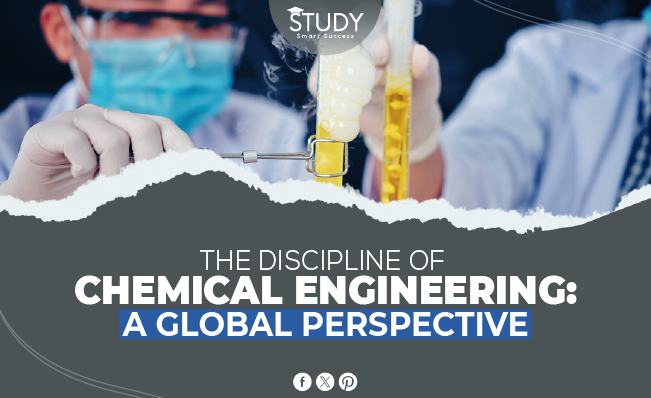Chemical engineering has a long history and many current uses. People joining or studying the field must understand the disciplines. This detailed book will cover all topic elements, giving insights, practical suggestions, and examples for chemical engineers and students.
Introduction to Chemical Engineering
Chemical engineering goes beyond chemistry and engineering. It entails planning, optimizing, and controlling processes that transform raw resources into valuable products. Chemical engineers help provide fuel for automobiles and medication for life. This blog will cover chemical engineering’s key fields, revealing its vastness.
Process Engineering
Chemical engineering revolves around process engineering. It includes industrial process design, implementation, and optimization. Chemical engineers in this field safely and effectively convert raw materials into final products. Their expertise helps them design equipment, simulate processes, and assure environmental and safety compliance.
Petrochemical process engineers convert crude oil into gasoline, diesel, and other essential products. They analyze production data to increase efficiency and eliminate waste. This field involves extensive thermodynamics, fluid dynamics, and chemical kinetics knowledge.
Materials Engineering
Materials engineering develops and utilizes specialized materials. These chemical engineers create materials with specific properties, including strength, flexibility, and heat and corrosion resistance.
Materials engineers create semiconductors and other electronic components that advance technology. Medical implants and prostheses use biocompatible materials. This field combines chemistry, physics, and engineering and requires molecular knowledge of materials.
Biochemical Engineering
Biochemical engineering develops biological organisms or molecular processes using chemical engineering and biology. This field is essential for pharmaceutical, biofuel, and food production.
In pharmaceutical manufacturing, biochemical engineers construct microbe or enzyme-based drug production methods. They optimize fermentation and maintain strict quality control. This discipline demands significant microbiology, biochemistry, and genetic engineering skills.
Environmental Engineering
Environmental engineering protects and improves nature. Chemical engineers in this sector create pollution-reduction and waste-management technology. Their specialities include water, air pollution, and sustainable energy.
For instance, car catalytic converters minimize hazardous pollutants. Environmental engineers create industrial wastewater treatment systems to eliminate dangerous chemicals before releasing the water. Chemistry, process engineering, and environmental laws are needed for this field.
Nanotechnology
It manipulates materials atomically or molecularly. Nanotechnology creates innovative materials and is used in chemical engineering.
Chemical engineers create nanoparticles for solar cells to boost efficiency and lower prices. They develop medication delivery technologies that target particular cells to reduce adverse effects. This innovative discipline integrates chemistry, physics, and biology and demands a profound grasp of nanoscale materials.
Petroleum Engineering
Petroleum engineering involves extracting and processing hydrocarbons like oil and gas. Chemical engineers in this field create and optimize drilling and refining processes.
Petroleum engineers create safe offshore drilling methods and improve recovery procedures to optimize reservoir oil extraction. This job requires geology, fluid mechanics, and process engineering.
Pharmaceutical Engineering
Pharmaceutical engineering develops and manufactures drugs and equipment. Chemical engineers in this discipline assure efficient, scalable, and regulatory-compliant manufacturing.
Pharmaceutical engineers develop methods for manufacturing active medicinal components, tablets, and injectables. They also produce transdermal patches and controlled-release capsules. This field combines chemistry, biology, and engineering and requires regulatory knowledge.
Food and Beverage Engineering
Food and beverage engineering involves food and drink manufacturing and processing. Chemical engineers in this profession produce new products, improve processes, and ensure food safety.
Engineers preserve milk’s nutritious content by pasteurizing it to remove dangerous microorganisms. They optimize beer and soft drink production methods for flavour and shelf life. This field needs food chemistry, microbiology, and process engineering.
Energy Engineering
Energy engineering involves energy generation, delivery, and storage. This group of chemical engineers develops biofuels, hydrogen fuel cells, and renewable energy technologies.
Energy engineers develop biomass-to-biofuel techniques to reduce fossil fuel use. They also boost solar and wind turbine efficiency to make renewable energy more economical. This job requires thermodynamics, chemical kinetics, and environmental engineering.
Polymer Engineering
Polymer engineering designs and develops long-chain polymers utilized in many goods. This discipline of chemical engineering creates polymers with specified qualities, including flexibility, strength, and heat and chemical resistance.
Polymer engineers create materials for automobiles, packaging, and medical devices. They also recycle plastics to reduce their environmental impact. This field requires organic chemistry, materials science, and process engineering.
Systems Engineering
Multiple disciplines work together to build and manage complex systems in systems engineering. Chemical engineers in this discipline integrate process components to guarantee efficiency and reliability.
Systems engineers create chemical plant temperature, pressure, and flow control systems. They optimize supply networks to transport raw materials and distribute goods effectively. This field demands process control, optimization, and project management.
Process Safety Engineering
Process safety engineering mitigates chemical process accidents. Chemical engineers evaluate risks, develop safety measures, and follow standards. They create excellent fire, explosion, and hazardous discharge strategies. Engineers may also design SIS and emergency response strategies to protect people and the environment. This industry requires substantial risk assessment, process safety management, and knowledge of industrial safety standards.
Electrochemical Engineering
Electrochemical engineering involves designing and implementing chemical reactions that transport electrons. Chemical engineers use electrochemistry to create batteries, fuel cells, and electrolysis processes. They also improve lithium-ion batteries and electrochemical sensors. This area requires knowledge of chemistry, material science, and thermodynamics.
Catalysis Engineering
Catalysis engineering accelerates chemical processes using catalysts. In this discipline, chemical engineers improve catalytic processes for refining, petrochemical manufacturing, and environmental protection. They create catalysts that enhance reaction efficiency and selectivity, saving energy and waste. This discipline combines chemistry, surface science, and reaction engineering.
Computational Chemical Engineering
Computational chemical engineering solves complex chemical engineering issues using computer simulations and mathematical models. This field’s engineers create software and algorithms to simulate chemical reactions, improve reaction conditions, and anticipate material qualities.
Computing tools are used for molecular modelling, process simulation, and data analysis. This requires programming, numerical methodologies, and chemical engineering knowledge.
Conclusion
Chemical engineering is a dynamic, multidisciplinary subject. Each field presents distinct difficulties and innovative prospects, from process engineering to nanotechnology. Chemical engineering is a fascinating area that may be better understood by knowing its branches.
Whatever your level of chemical engineering experience, there’s always more to learn and explore. Stay interested and knowledgeable, and push chemical engineering to its limits.
If you want to learn more about these fields or keep current, sign up for our newsletter or join our network of like-minded professionals. We can influence chemical engineering’s future.


